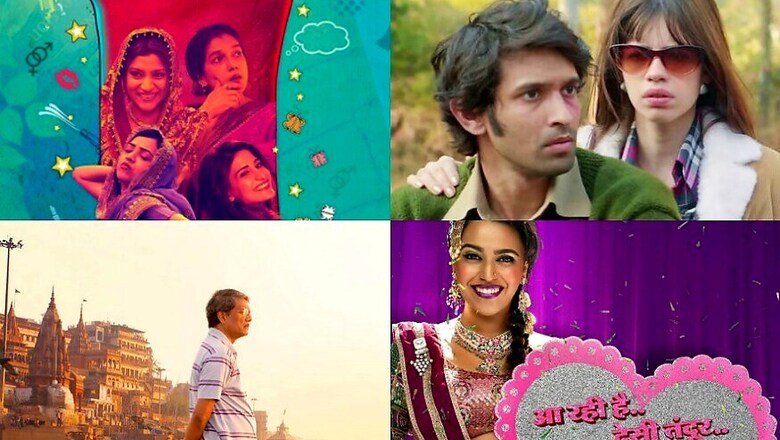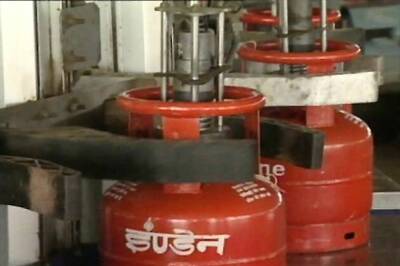
views
Half of 2017 is gone and the next half has begun. The year so far hasn't been a delight for the fans of masala Bollywood, but for cine-goers, who're content with minimalistic approaches, the industry has paved way for quite a few such cinematic offerings. Apart from commercial potboilers and art house films, the first six months have witnessed a boom in the genre of experimental films. Many filmmakers ditched the set formula, detoured to risky yet pioneering ideas and managed to create some noteworthy works. While some of those did well at the Box Office, others couldn't continue a brawny run, but nonetheless cemented their position as experimental films that deserve to be acknowledged.
These films didn't necessarily cast an 'A-lister' or boasted of a high-budget, but, rode high on content, performances, intent and an enriching plot - enough to intrigue the cinema buffs.
As we step into the next half, here's a quick lowdown on some of the most experimental films so far.
Mukti Bhawan
Death - a concept that Bollywood has reduced to over-dramatised scenes - was tapped on its full potential when filmmaker Shubhashish Bhutiani decided to carve a tragicomedy out of it. Mukti Bhawan is more than just a sombre take on dynamics of a father-son relationship and delves deeper into one's inner soul (and demons). When a 77-year-old Daya (Lalit Behl) realises that his time is nearing, he wishes to breathe his last and attain salvation in Benares. Rajiv, his office-bound son, accompanies him and the film then unfolds in a form of conversation bringing to celluloid the ironies of life and mortality. Benares, however, is not just a backdrop of this tale, but the soul of this film and breathes a life of its own. It's a rare film, that despite dealing with the inevitable death, makes you smile.
Anarkali Of Aarah
Considering that both Pink and Anarkali of Aarah dealt with the idea of consent, Avinash Das carried on his shoulders the burden of Pink's success. But his attempt, a rather successful one, compensated for all that Pink lacked. The film features the story of Anarkali (Swara Bhaskar), a small-town erotic performer, who gets groped by a desperate vice chancellor (Sanjay Mishra) during a live performance. Instead of portraying Anarkali as a hero, the film sees her as a human - more enriched by her flaws than her pluses. The film doesn't resort to glamorous antics but stays true to its idea and that's what makes it a winner despite all its shortcomings.
A Death In The Gunj
Konkona Sehsharma's directorial debut is an unsettling experience - in a good way. Set in the gloomy winters of 1979, in a colonial town called McCluskieganj, Bihar, the film is basically a family holiday gone wrong - in its most literal meaning. With an ensemble cast including Vikrant Massey, Tiotama Shome, Ranvir Shorey, Gulshan Devaiah and Kalki Koechlin, the film evokes a myriad of emotions and finely deals with a plethora of subjects. A fresh look at the complex family dynamics, a doyenne bullying, a mind dealing with grief, a soul craving for attention, a palpable sexual tension, a sexual desire, a sense of patriarchy is all there, not just in words, but in acts and symbolism too. In fact, McCluskieganj is more a character than a backdrop and at the centre of it, lies the accurate detailing from Konkona's end. As much as the film cements Konkona's place as a director to look forward to, it puts Vikrant as the front runners in the highest echelons of the acting talent we've today.
Haraamkhor
Directed by Shlok Sharma, Haraamkhor boasts of an unusual casting apart from its dark storyline. Set in an unknown village of Gujarat, the film revolves around an 'unacceptable' relationship between a 14-year-old Sandhya (Shweta Tripathi) and her teacher Shyam (Nawazuddin Siddiqui). Even though the film isn't as murky as one'd expect it to be, the intricacies of sensitive thematic handling work well. The film leaves a lot of open-ended questions and interpretations to viewers' minds - to each, their own.
Lipstick Under My Burkha
Alankrita Shrivastava probably made the riskiest Bollywood debut when she decided to helm a film based on four women, of differing age groups and phases - aware, conscious and ready to explore their sexuality. The film, featuring Ratna Shah Pathak, Konkona Sensharma, Plabita Borthakur and Aahana Kumra, found itself at the receiving end of CBFC's myriad ideologies when the board deemed the film 'too women-oriented' and decided not to certify the film. Through the window of Rosie, a fictional character, Srivastava brought alive the unspoken, unattended and unwavering 'lipistick waale sapne' of womankind. The film knits a rebellious world of four women - an older woman who finds pleasure in reading erotic novels, a mother of 3 who is reduced to a sex object by her husband, a free-spirited woman who finds Bhopal and its ideologies too restricting for her and a millennial who steps out in burkha but soon changes to ripped denims and aspires to be a pop icon. Each woman, though leading a battle starkly different from each other, is woven tautly through a unifying undertone of sexual reveries.
Sonata
In a living room of a decently posh Mumbai flat, an award-winning author, linguistic professor Aruna Chaturvedi (Aparna Sen) lives with her college mate, a Bengali beauty Dolon Sen (Shabana Azmi), who earns big and spends bigger. Subhadra (Lillete Dubey), a journalist, keeps coming in their lives often initiating discussions soaked in the nostalgia of the familiar and the longing for the unfamiliar. Even though Sonata is more like a stage play trying too hard to fit as a film, it's noteworthy that Sen brings to screen what Bollywood has always shied away from - the psyche of old unmarried women.


















Comments
0 comment